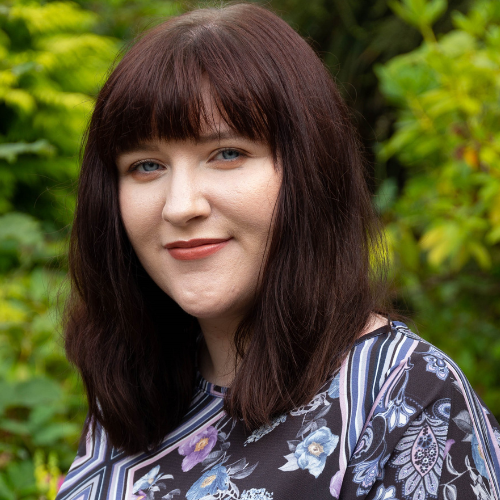
Meet last year’s Research Excellence Awardee - Dr Rebecca Randles
Welcome to a special edition of our regular 'Meet the Expert' series, bringing you informative interviews with Armed Forces researchers, policy makers and service providers. In this edition, we interviewed one of the winners of the 2023 FiMT Research Centre Conference Awards, which are awarded annually at the FiMT Research Centre Conference. Read on to hear about their career so far and their award-winning work.
 Our interviewee and previous award winner Dr Rebecca Randles is a Lecturer in Psychology at Arden University, and was previously a Senior Researcher at the Westminster Centre for Research in Veterans based at the University of Chester. Rebecca received the 2023 FiMT Research Centre Conference Research Excellence Award, for her high quality and innovative work on the 'Where are all the Veterans’ project, conducted at the University of Chester
Our interviewee and previous award winner Dr Rebecca Randles is a Lecturer in Psychology at Arden University, and was previously a Senior Researcher at the Westminster Centre for Research in Veterans based at the University of Chester. Rebecca received the 2023 FiMT Research Centre Conference Research Excellence Award, for her high quality and innovative work on the 'Where are all the Veterans’ project, conducted at the University of Chester
Can you tell us about your background and how you came to be involved in work relating to the Armed Forces Community?
My background is predominantly within psychology, my undergraduate degree and PhD are both within the discipline. I’ve always had an interest in health inequalities, specifically mental health, and what we can do to help those who may be disadvantaged in accessing those services whether it be through their own internalised stigma or through other psychosocial factors that may be impacting on their help-seeking behaviour. Fairly fresh out of my PhD, I was working at the University of Liverpool in widening participation and my contract was due to end, it was then that I saw a role for a Researcher in the Westminster Centre for Research in Veterans at the University of Chester. The Armed Forces Community was never a group that had been on my radar until that point, despite having grandparents who had Served, I applied for the role and became a Senior Researcher after a year and a half. Working in the Centre opened my eyes to the numerous inequalities faced by the Armed Forces Community and particularly the disadvantages faced by Veterans and their families during their transition into civilian life. This is something that I have become embedded in and want to continue researching in my current role as a Lecturer in Psychology at Arden University.
You were awarded the 2023 FiMT Research Centre Conference Research Excellence award, celebrating a researcher who has produced an excellent piece of high-quality research in the last year. Could you tell us about your award-winning project, "Where Are All the Veterans"?
This project came off the back of a pilot conducted in Lancashire named “Finding the Forgotten” [1] which essentially looked to identify Veterans on their medical records within primary healthcare. This was a short project implementing very simple initiatives such as a zap stand and posters, asking patients to identify themselves to their primary healthcare practice. “Where Are All the Veterans” [2] was a follow-on from this, conducted with more practices, across a longer period and implementing numerous different initiatives. The key here was to inform Veterans of the benefit of disclosing, of making them aware that they would be able to have access to Veteran-specific services like Op Courage and Op Restore, with Veterans often believing that civilian healthcare services won’t understand their difficulties. We were able to raise the number of identified Veterans by over 200% in just 6 months, during the period of national lockdowns. Our most effective initiative is a simple one, the use of text messaging. We simply asked practices to send a text message to all patients asking whether they had ever served in the British Military, the practices that were able to batch text their entire patient population and whose responses were automatically coded saw a drastic increase in the number of Veterans identified. Having that identification on their medical record, also meant that we were able to do additional work on the prevalence of mental health disorders in military Veterans. We utilised what is known as “Read Codes,” now being replaced by “SNOMED CT” codes, to report on mental health prevalence, which had never been done before. This led to the publication of a paper [3] which has now been the most-read paper in BMJ Military Health for 2022 and 2023. This also has led to important further work looking to compare this prevalence with a matched civilian population which is work currently being undertaken by the Centre which will help to inform policy for better patient-centred practice.
As one of the 2023 award winners, you will be presenting at the 2024 FiMT Research Centre conference on 13th May. The conference theme this year is ‘Research with Impact for ex-Service personnel and their families.’ With the theme considered, could you outline the potential impact of the work you will be presenting for ex-Service personnel and their families?
When conducting this research, results also emerged from the discussions with practice staff and expert interviews. Practice staff reported that they were not aware that they needed to record Veteran details and did not understand the benefits of doing so before engaging in the project. Expert interviews revealed that Veterans often do not know of the services that are available to them and are often reluctant to get help for any Service-related issues as they believe that civilian healthcare will not understand their issues. Therefore, the impact of identifying those Veterans ensures that they have access to those services when the presenting issues are Service-related, it ensures that their healthcare professionals are aware of their Service and aware of how they may present with any difficulties, and it also has educated primary healthcare staff about both the Armed Forces Community and their patient population to ensure that they are getting the best patient-centred care possible. Which ultimately, should lead to better support for the Armed Forces Community.
What do you think the next steps are, research or otherwise, for this area of work?
The research we conducted involved 12 primary healthcare practices in one area in the North-West of England. It’s such a small number compared to the large number of practices in England, who may be unaware of their duty to identify Veterans and be uneducated about the difficulties faced by the Armed Forces Community. Some of this work has started to be improved through the Royal College of General Practitioners (RCGP) Veteran-friendly accreditation but not all practices have been reached and some may not have continued with that work. I think that facilitating a massive education piece across the practices would be worthwhile and perhaps a higher policy change that would motivate practices to stay engaged with the group. In addition, I also think that a similar initiative should be implemented for families of Veterans, identifying partners, siblings, parents, and children, as they also have unique difficulties that they will face which are often forgotten. One of the key takeaways we found with this project was the lack of consistency in the practices, some were already identifying, and it was working well, and some were not. Text messaging and recording systems were often different, and levels of education were very person dependent and if that person left, the work would have been left behind. Therefore, there needs to be consistency across the piste.
What did it mean for you to receive this award – how might it have positively impacted you and your work?
My goal as a researcher has always been to conduct research that makes an impact and makes a difference, not just research that will be published and never be read or used. The recognition of this work not only makes me feel like I have managed to achieve this, but also it is striving me to conduct further work that continues to have that positive impact. Additionally, as an early-career researcher, imposter syndrome often creeps in, and having that validation of knowing that your research is being recognised and believed to be important, means a lot to me.
Many thanks to Dr Rebecca Randles for sharing her insights, and we look forward to hearing her speak at the 2024 FiMT Research Centre Conference on May 13th 2024. For more information on the conference, click here to head to our conference page.
Nominations for the upcoming 2024 FiMT Research Centre Conference Awards are currently open. To nominate someone that you think is producing exceptional work that deserves recognition for the Research Excellence award or Lifetime Achievement award, click here.
Catch us next month for another interesting and informative interview with an expert from the Armed Forces Community.
References
1. Finnegan, A., Jackson, R., & Simpson, R. (2018). Finding the Forgotten: Motivating Military Veterans to Register with a Primary Healthcare Practice. Military Medicine, 183(11–12), e509–e517. online at: https://www.fimt-rc.org/article/20180509-finding-the-forgotten-motivating-military-veterans-to-register-with-a-primary-healthcare-practice
2. Finnegan, A., & Randles, R. (2023). Where are all the veterans? A mixed methods assessment of a systematic strategy to increase veteran registration in UK primary healthcare practices. BMJ Open, 13(6), e068904. online at: https://www.fimt-rc.org/article/20230609-where-are-all-the-veterans-a-mixed-methods-assessment-of-a-systematic-strategy-to-increase-veteran-registration-in-uk-primary-healthcare-practices
3. Finnegan, A., & Randles, R. (2023). Prevalence of common mental health disorders in military veterans: using primary healthcare data. BMJ Military Health, 169(6), 523–528. online at: https://www.fimt-rc.org/article/20220118-prevalence-of-common-mental-health-disorders-in-military-veterans-using-primary-healthcare-data